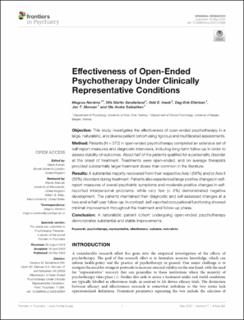| dc.contributor.author | Nordmo, Magnus | |
| dc.contributor.author | Sønderland, Nils Martin | |
| dc.contributor.author | Havik, Odd E. | |
| dc.contributor.author | Eilertsen, Dag-Erik | |
| dc.contributor.author | Monsen, Jon Trygve | |
| dc.contributor.author | Solbakken, Ole Andre | |
| dc.date.accessioned | 2021-07-09T07:25:09Z | |
| dc.date.available | 2021-07-09T07:25:09Z | |
| dc.date.created | 2021-01-27T11:46:00Z | |
| dc.date.issued | 2020-05-20 | |
| dc.identifier.issn | 1664-0640 | |
| dc.identifier.uri | https://hdl.handle.net/11250/2763995 | |
| dc.description.abstract | Objective: This study investigates the effectiveness of open-ended psychotherapy in a large, naturalistic, and diverse patient cohort using rigorous and multifaceted assessments.
Method: Patients (N = 370) in open-ended psychotherapy completed an extensive set of self-report measures and diagnostic interviews, including long-term follow-up in order to assess stability of outcomes. About half of the patients qualified for a personality disorder at the onset of treatment. Treatments were open-ended, and on average therapists provided substantially larger treatment doses than common in the literature.
Results: A substantial majority recovered from their respective Axis I (58%) and/or Axis II (55%) disorders during treatment. Patients also experienced large positive changes in self-report measures of overall psychiatric symptoms and moderate positive changes in self-reported interpersonal problems, while very few (< 3%) demonstrated negative development. The patients maintained their diagnostic and self-assessed changes at a two-and-a-half-year follow-up. In contrast, self-reported occupational functioning showed minimal improvement throughout the treatment and follow-up phase.
Conclusion: A naturalistic patient cohort undergoing open-ended psychotherapy demonstrates substantial and stable improvements. | en_US |
| dc.language.iso | eng | en_US |
| dc.publisher | Frontiers | en_US |
| dc.rights | Navngivelse 4.0 Internasjonal | * |
| dc.rights.uri | http://creativecommons.org/licenses/by/4.0/deed.no | * |
| dc.title | Effectiveness of open-ended psychotherapy under clinically representative conditions | en_US |
| dc.type | Journal article | en_US |
| dc.type | Peer reviewed | en_US |
| dc.description.version | publishedVersion | en_US |
| dc.rights.holder | Copyright the authors | en_US |
| dc.source.articlenumber | 384 | en_US |
| cristin.ispublished | true | |
| cristin.fulltext | original | |
| cristin.qualitycode | 1 | |
| dc.identifier.doi | 10.3389/fpsyt.2020.00384 | |
| dc.identifier.cristin | 1880236 | |
| dc.source.journal | Frontiers in Psychiatry | en_US |
| dc.identifier.citation | Frontiers in Psychiatry. 2020, 11, 384. | en_US |
| dc.source.volume | 11 | en_US |

